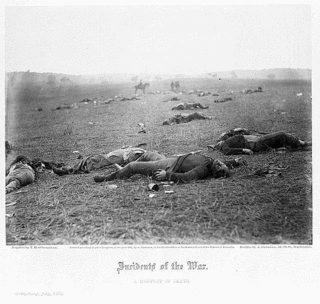
Suffering is nothing new to the human condition. During the Battle of Gettysburg, Pa., the Union and Confederate armies sustained 50,000 casualities; 7,000 thousand soldiers died. Above, "Harvest of Death," a photo by Timothy O'Sullivan, documents the battle's toll.
Continued from previous page
The Bible tells of Job, the good man who was unfairly and severely afflicted, losing children and property and nearly his life, Job rails at God and says “Why me? Why this?”
God responds and the divine voice is dripping with sarcasm.
"Who is this,” he says to Job, “that darkens counsel by words without knowledge? Gird up your loins like a man, I will question you, and you shall declare to me.”
Then God asks whether it was Job who “laid the foundation of the earth?” God asks “Have you commanded the morning since your days began, and caused the dawn to know its place?”
“Have you entered into the springs of the sea, or walked in the recesses of the deep? Have the gates of death been revealed to you, or have you seen the gates of deep darkness? Have you comprehended the expanse of the earth? Declare, if you know all this.”
In short, the answer is: Who are you to ask such things?
To some that sounds harsh: but to those who understand the relationship between the Creator and the creation, it is not. God rightly reminds us that we do not know everything, nor are we entitled to know everything.
Every time a natural disaster strikes, we learn that creation operates according to a design and that God rarely tinkers with the design. The sun rises and sets. Seasons come and go. Storms form--according to the physical principles of the world--and oftimes they do damage. That’s the way the world works.
We must also take our own responsibility for human suffering. New Orleans was built 25 feet below sea level and over the last 200 years never developed an adequate means of dealing with a major storm, which everyone knew would eventually come.
God weeps and suffers with us when we do foolish things. And that God inspires us--if we listen--to help one another recover and not to do foolish things again.
We are now swamped with horrible images from the Gulf Coast. The news tells us of both the bravery and cruelty of our fellow human beings. In the weeks ahead, we will have to be loving and sharing to those who suffer, whatever the cause.
But it is not too soon to look at the bigger questions of disaster and suffering. We are nearing Sept. 11, a time to remember another kind of disaster and suffering.
Many still say the world “changed” that Tuesday morning when the planes attacked New York and Washington. Perhaps our part of the world did, perhaps not.
But “the world” is the same--filed with people capable of great good and horrendous evil. What has changed is that disaster and suffering came closer to us.
Others--in Northern Ireland and Israel for example--have lived with terrorism for many years. Others--in the Balkans or Central Africa, for example--have never known a world without terrible religious, racial or ethnic strife. Millions in Africa have died in civil wars and AIDS epidemics in the past eight years while the world did nothing and the United States blocked some efforts to bring relief.
A few days after that awful September 11, I was at Congregation Shomrei Torah in Wayne, N.J., a conservative Jewish synagogue.
About 30 men wrapped themselves in their prayer shawls and prayed the ancient prayers. The rituals of Conservative Judaism are rigid; you don’t fiddle with them just to suit the moment. And the prayers that day were about praising God, blessing God’s name, honoring God. They thanked God for calling them into the covenant with God; they thanked God for the Torah, and they remembered the ancestors--Abraham, Isaac, Jacob, Moses. They thanked God for giving them the victory. Here were the ancient people of Israel, beset on every side by enemies, still praising God.
In New Orleans and Mississippi on Sunday, people of faith gathered to worship, give thanks to God and praise God in the midst of their suffering.
It helps to put the horrifying events of our world into a historical perspective. When a terror strikes our land or close to us it seems particularly awful because it affects us personally. That’s because in this land we have been complacent and so blessedly free of such things.
Most of the catastrophes of the world have nothing to do with floods or hurricanes, but with our abuse of our humanity and the evils we perpetrate upon one another.
The first great terror to strike Christians was the Roman persecutions when believers in Jesus were tortured or put to death. We romanticize that as a time of glorious saints; but the people suffering probably didn’t see it that way.
Let’s skip around in history and see how suffering is not a new thing.
The armies of the first Crusade in the 11th Century reached Jerusalem and slaughtered thousands of Muslims and Jews. One eyewitness said the streets literally ran with blood, up to the knees of the horses. This witness thought that was glorious because it was the blood of the “unbelievers.”
A couple of hundred years later, a peasant boy in Germany envisioned a “children’s crusade.” Perhaps as many as 20,000 children set out to rescue the Holy Land. Thousands perished and the crusade never reached its goal. In Egypt most of them were sold into slavery.
Let us not forget the torturing and burning of heretics - in the name of Jesus, of course--by the Spanish inquisition beginning in the 13th century.
The list goes on:
*France, August 24, 1572 and the days following: Perhaps as many as 50,000 Protestants were killed by troops loyal to a Catholic monarch.
*France, 1793: The “reign of terror” begins, with torture and the guillotine being the chief instruments of government.
To come closer to our time:
*Georgia, 1838: The United States forcibly relocates the Cherokee tribes to Indian Territory (now Oklahoma). More than 4,000 die along the way in the trek known as the Trail of Tears.
*Gettysburg, 1863: 50,000 casualties in three days.
*Verdun, 1916: A ten-mile front in the war in Europe sustains 700,000 casualties in eight months.
What a sad list it could be--the Lusitania, Bataan death march, Soviet Gulag, and more.
We can hope that these awful events and the catastrophes of our time would lead us to offer more prayers, more witness to peace, more pleas for friendship among all humankind. Believers dare to hope that--because God is gracious and sends grace to us--we can learn to be gracious to others.
A natural disaster may destroy property, may even kill; but it does not destroy our ability to be caring and gracious. Sometimes, it brings out our generosity.
Where is God in human suffering?
The answer lies not with God, but with us.
We are God’s eyes and hands and voice who must bring God’s grace into the work and help the sick recover. It is our words, our acts as individuals and as a nation that does this. Christian faith calls upon believers to show the world what it means to follow Jesus and to bring healing.
If anything gets in the way of that mission--internationally, nationally or locally--then there will be more suffering, more loss.
There will have to be national programs of relief; and we have the capacity to create them. Are we distracted by an international war that is going badly? Are the institutions of our national government maybe captive to forces with their own, non-humanitarian agendas?
In any struggle to relieve human suffering, whether caused by natural or man-made disasters, God is with us. That is, God wants to be with us, especially as we try to protect and save those who are poor and needy. Sometimes greed, national pride, political chicanery or apathy obstructs the grace of God.
Christians are to pray for the poor and needy, provide what help they can as individuals and to work in society--by any peaceful means--to help nations get their priorities straight.
God has promised to be with us, providing grace and love and comfort and strength. Can we--as individuals and a society--act accordingly?
Return to main page to comment on article.

No comments:
Post a Comment